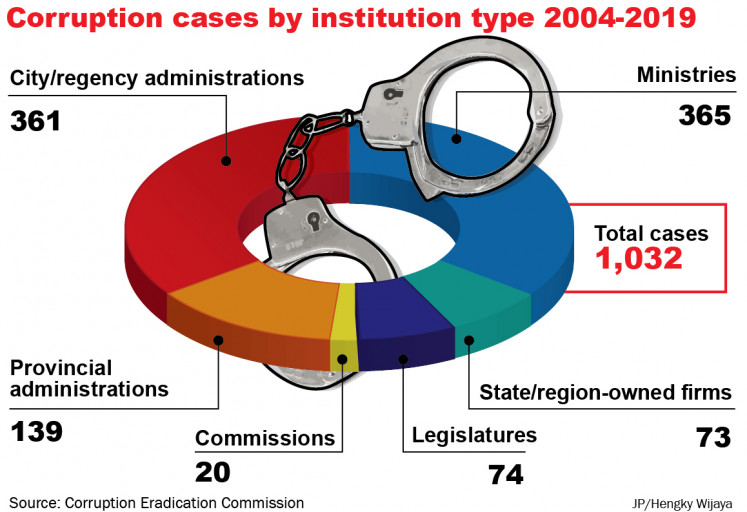Popular Reads
Top Results
Can't find what you're looking for?
View all search resultsPopular Reads
Top Results
Can't find what you're looking for?
View all search resultsJobs bill puts spotlight on graft in natural resources sector in Indonesia
Draft law would strip licensing power from local administrations.
Change text size
Gift Premium Articles
to Anyone
A
mid rampant corruption in the natural resources sector, the government is proposing centralized licensing and environmental management in the omnibus bill on job creation, in a move that would be a step back for regional autonomy.
The bill, which consists of 1,028 pages, aims to revise 79 prevailing laws, including the Spatial Planning Law, Environmental Management Law and Forestry Law.
Under the bill, local administrations would be stripped of their power to manage natural resources and the environment and the central government would be the only authority on spatial planning and land, forest and coastal area management.
It would cut layers of licensing processes, including the requirement for businesses to obtain an Environmental Impact Analysis (Amdal) document, which is currently issued by local administrations. If the bill is passed into law, the process will be supervised by the central government.
Businesses would still be obliged to prevent environmental damages, but they would have to report to the central government, which would hold all supervising duties.
Waste-dumping permits are currently acquired through governors, mayors or regents. Under the omnibus bill, the central government would hand out the permits.
Environmental restoration funds that companies are required to prepare would have to be deposited at banks selected by the central government. Currently, regional leaders select the banks.
Indonesian Forum for the Environment (Walhi) executive director Nur Hidayati said Amdal had been ineffective in preventing environmental damages because of rampant corruption, but it did not mean that it had to be eliminated.
“If it is found to be ineffective, it should be fixed instead. The reason it is ineffective in the first place is because there is no political will to save the environment,” Hidayati said.
She said it was critical to protect the environment since Indonesia was prone to natural disasters.
The Corruption Eradication Corruption (KPK), through its National Movement to Save Natural Resources (GNP-SDA), has conducted annual research to eradicate graft in the natural resources sector since 2009.
One of its recent studies revealed that there was possible corruption during the issuance of Amdal and other environmental permits. In 2018, it was reported that at least 40,000 environmental studies may have been tainted by bribery.
The antigraft body estimated that, within a year, Rp 51 trillion had been lost to bribery. In the forestry sector, it costs a company or a group an estimated Rp 688 million to Rp 22 billion a year to obtain a license.
The KPK has also investigated 27 corruption cases in the natural resources sector since 2009.
KPK spokesperson Ali Fikri said the cases were usually related to kickbacks or other forms of gratuities that local administrations received to process business permits.
“The modus operandi of the cases was similar, namely the abuse of authority to grant permits, which leads to cash transfer [bribes],” Fikri said, adding that he was skeptical that the omnibus bill would put a stop to the illicit practice.
The Corruption Eradication Commission (KPK) has investigated 27 corruption cases in the natural resources sector since 2009. (JP/Hengky Wijaya)Indonesia Corruption Watch (ICW) estimated that graft in the natural resources sector caused Rp 6 trillion in state losses last year, the highest of any sector.
Like Fikri, ICW researcher Egi Primayogha expressed doubt over corruption ending with the central government in charge.
“A transfer of authority will not end corruption as long as bureaucracy is still nontransparent, incompetent and slow,” Egi said.
For two decades, Indonesia has run under a system in which authorities and budgeting are decentralized, giving regional autonomy to local administrations. The move to decentralize power was aimed to end the development gap between Java and other islands as the result of the highly centralized government under Soeharto.
Think tank Regional Autonomy Watch executive director Robert Endi Jaweng said removing licensing powers from local administrations would be against Law No. 23/2014 on regional administrations. The law lists the environment as an area that should be managed under local governments.
Robert said that, to end corruption, the central government could issue business permits, while local administrations could remain in charge of issuing environmental, spatial and building permits.
"The one that understands the environmental situation in each region is the local administration. Does the central government even have the capacity to supervise all 514 cities and regencies?" he said.
Robert said that while the proposed centralized licensing provisions in the omnibus bill should be looked at as an opportunity to eradicate corruption, they should be subject to review.
"The other option is the central government improves its ability to supervise the regions. This is important because [corruption cases] might be caused by a lack of guidance and supervision from the central government," he said.
Indonesia Regents Association chairman Abdullah Azwar Anas said the association supported the bill since it aimed to woo investors.
“But environmental oversight should be our collective responsibility,” said Anas, who is also the regent of Banyuwangi, East Java.
--Ardila Syakriah contributed to this report.











